Ditapis dengan

Mind and Imagination in Aristotle
- Edisi
- 1
- ISBN/ISSN
- 0300042310
- Deskripsi Fisik
- xiv, 292
- Judul Seri
- -
- No. Panggil
- 128.20924 W37m
- Edisi
- 1
- ISBN/ISSN
- 0300042310
- Deskripsi Fisik
- xiv, 292
- Judul Seri
- -
- No. Panggil
- 128.20924 W37m

History of Western Philosophy, A
- Edisi
- 1
- ISBN/ISSN
- 0671201581
- Deskripsi Fisik
- xxiii, 895
- Judul Seri
- -
- No. Panggil
- 109 R91h
- Edisi
- 1
- ISBN/ISSN
- 0671201581
- Deskripsi Fisik
- xxiii, 895
- Judul Seri
- -
- No. Panggil
- 109 R91h

Filsafat dan Iman Kristen
261.51
- Edisi
- 1
- ISBN/ISSN
- 9798307202
- Deskripsi Fisik
- 245
- Judul Seri
- -
- No. Panggil
- 261.51 B82f

History of Western Philosophy and Theology, A
Outline: This book is the fruit of the author's forty-five years of teaching philosophical subjects...
- Edisi
- First Edition
- ISBN/ISSN
- 978-1-62995-084-6
- Deskripsi Fisik
- 875
- Judul Seri
- -
- No. Panggil
- 261.5'1 F84h

Christianity and Western Thought : A History of Philosophers, Ideas and Movem…
Outline: Along with a loss of faith in reason and science, the twentieth century witnessed a loss of faith in the human self and society as a whole. Two devastating world wars left scant reason for Enlightenment optimism. Commencing with Frege, Husserl and Bergson, Alan Padgett and Steve Wilkens chart the course of twentieth-century philosophy on its journey toward postmodernism. The voyage is …
- Edisi
- -
- ISBN/ISSN
- 978-0-8308-3953-7
- Deskripsi Fisik
- 388 hal
- Judul Seri
- -
- No. Panggil
- 261.51 W63c v.3

Histories and fallacies: Problems Faced in the Writing of History
- Edisi
- First Edition
- ISBN/ISSN
- 978-1-58134-923-8
- Deskripsi Fisik
- 192 hal
- Judul Seri
- -
- No. Panggil
- 907.2 T768h
- Edisi
- First Edition
- ISBN/ISSN
- 978-1-58134-923-8
- Deskripsi Fisik
- 192 hal
- Judul Seri
- -
- No. Panggil
- 907.2 T768h
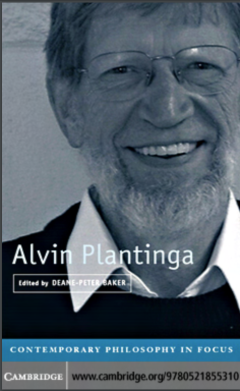
Alvin Plantinga
The dominance of logical empiricism’s verification principle in the middle part of the twentieth century forced philosophy of religion almost entirely out of the philosophy curriculum, and, with a few notable exceptions, few philosophers willingly identified themselves as Christians. However, logical empiricism collapsed under the weight of its own principles, and in the spring of 1980 Time m…
- Edisi
- -
- ISBN/ISSN
- 978-0-511-28940-8
- Deskripsi Fisik
- 233 p.
- Judul Seri
- -
- No. Panggil
- online

Structure and Being: A Theoretical Framework for a Systematic Philosophy
The systematic philosophy presented in this book has arisen from two insights, formulable as two theses, resulting from a long and intensive occupation with the fundamental philosophical conceptions from history and of the present. The first thesis is that, in terms of its intention, self-understanding, and accomplishments, the theoretical enterprise that for over two thousand years has been de…
- Edisi
- -
- ISBN/ISSN
- 978-0-271-03373-0
- Deskripsi Fisik
- 518 p.
- Judul Seri
- -
- No. Panggil
- online
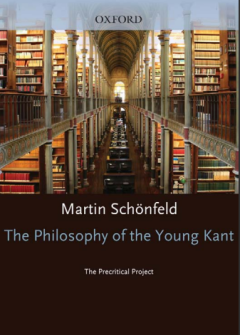
The Philosophy of the Young Kant: The Precritical Project
THIS BOOK IS about the young Kant. It is an investigation of the first two decades of his philosophical life, from the Thoughts on the True Estimation of Living Forces (1746/7) to the Dreams of a Spirit-Seer (1766). I examine the rise and fall of the ‘‘precritical’’ theories and place them in their historical and topical context—exploring how Kant resolved problems his predecessors an…
- Edisi
- 1
- ISBN/ISSN
- 0-19-513218-1
- Deskripsi Fisik
- 348 p.
- Judul Seri
- -
- No. Panggil
- online
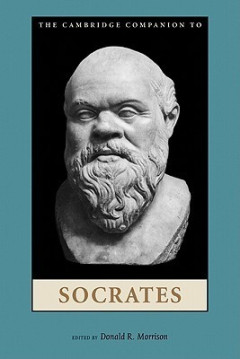
The Cambridge Companion to Socrates
The Cambridge Companion to Socrates is a collection of essays providing a comprehensive guide to Socrates, the most famous Greek philosopher. Because Socrates himself wrote nothing, our evidence comes from the writings of his friends (above all Plato), his enemies, and later writers. Socrates is thus a literary figure as well as a historical person. Both aspects of Socrates’ legacy are covere…
- Edisi
- First
- ISBN/ISSN
- 9780521833424
- Deskripsi Fisik
- 438 p.
- Judul Seri
- -
- No. Panggil
- online
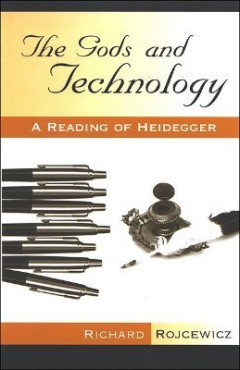
The Gods and Technology: a reading of heidegger
The Gods and Technology is a careful and original reading of the principal statement of Martin Heidegger's philosophy of technology, the essay Die Frage nach der Technik ("The question concerning technology"). That essay is a rich one, and Richard Rojcewicz's goal is to mine it for the treasures only a close reading of the original German text can bring out. Rojcewicz shows how the issue of tec…
- Edisi
- First
- ISBN/ISSN
- 9780791466414
- Deskripsi Fisik
- 248 p.
- Judul Seri
- -
- No. Panggil
- online
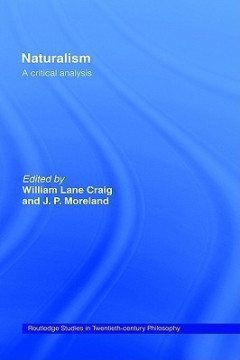
Naturalism : a critical analysis
Naturalism provides a rigorous analysis and critique of the major varieties of contemporary philosophical naturalism. The authors advocate the thesis that contemporary naturalism should be abandoned, in light of the serious objections raised against it. Contributors draw on a wide range of topics including: epistemology, the philosophy of science, the philosophy of mind and agency, and natural …
- Edisi
- First
- ISBN/ISSN
- 0415235243
- Deskripsi Fisik
- 286 p. : illus
- Judul Seri
- -
- No. Panggil
- -
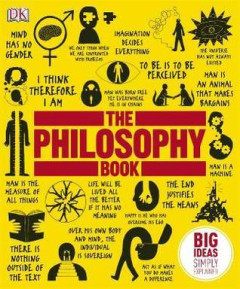
The Philosophy Book: Big Ideas Simply Explained
The Philosophy Book explains more than one hundred of the greatest ideas in philosophy through clear, succinct text and easy-to-follow graphics. Using straightforward graphics and artworks, as well as thoroughly accessible text that elucidates more than two thousand years of philosophical thought, The Philosophy Book makes abstract concepts concrete. From moral ethics to the philosoph…
- Edisi
- First
- ISBN/ISSN
- 9780756668617
- Deskripsi Fisik
- 352 p. : illus ; 25 cm
- Judul Seri
- -
- No. Panggil
- -
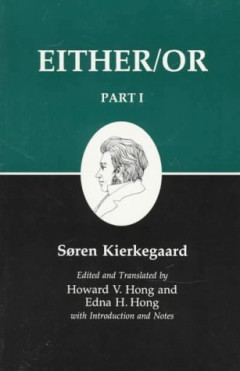
Either/Or: Part I
Søren Kierkegaard, the nineteenth-century Danish philosopher rediscovered in the twentieth century, is a major influence in contemporary philosophy, religion, and literature. He regarded Either/Or as the beginning of his authorship, although he had published two earlier works on Hans Christian Andersen and irony. The pseudonymous volumes of Either/Or are the writings of a young man (I) and of …
- Edisi
- First
- ISBN/ISSN
- 0691073155
- Deskripsi Fisik
- 702 p.
- Judul Seri
- -
- No. Panggil
- -
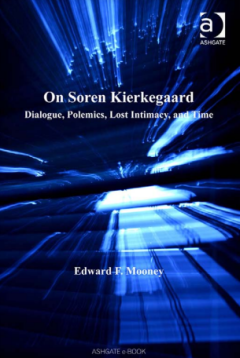
On Soren Kierkegaard
Tracing a path through Kierkegaard's writings, this book brings the reader into close contact with the texts and purposes of this remarkable 19th century Danish writer and thinker. Kierkegaard writes in a number of voices and registers: as a sharp observer and critic of Danish culture, or as a moral psychologist, and as a writer concerned to evoke the religious way of life of Socrates, Abraham,…
- Edisi
- First Edition
- ISBN/ISSN
- 0-7546-5820-1
- Deskripsi Fisik
- 266 p.
- Judul Seri
- -
- No. Panggil
- online
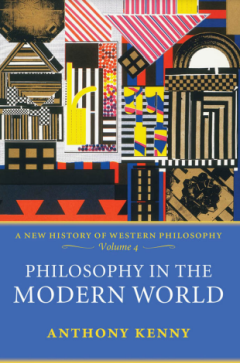
Philosophy in the Modern World
Here is the concluding volume of Sir Anthony Kenny's monumental four-volume history of philosophy, the first major single-author narrative history to appear for several decades. In this volume, Kenny tells the fascinating story of the development of philosophy in the modern world, from the early nineteenth century to the end of the millennium.
- Edisi
- First Edition
- ISBN/ISSN
- 9780198752790
- Deskripsi Fisik
- 347 p. : illustrations
- Judul Seri
- A New History of Western Philosophy
- No. Panggil
- online
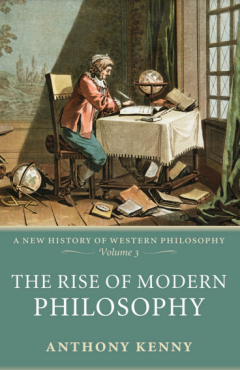
The Rise of Modern Philosophy
Sir Anthony Kenny's engaging new multi-volume history of Western philosophy now advances into the modern era. The Rise of Modern Philosophy captures the fascinating story of the emergence, from the early sixteenth to the early nineteenth century, of the great ideas and intellectual systems that shaped modern thought.
- Edisi
- First Edition
- ISBN/ISSN
- 9780198752769
- Deskripsi Fisik
- 356 p. : illustrations ; 23 cm.
- Judul Seri
- A New History of Western Philosophy
- No. Panggil
- online
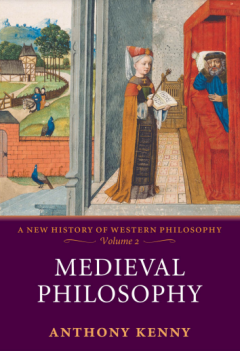
Medieval Philosophy
Sir Anthony Kenny here continues his fascinating account of the history of philosophy, focusing on the thousand-year-long medieval period. This is the second volume of a four-book set in which Kenny will unfold a magisterial new history of Western philosophy, the first major single-author history of philosophy to appear in decades.
- Edisi
- First Edition
- ISBN/ISSN
- 0-19-875275-X
- Deskripsi Fisik
- 356 p.
- Judul Seri
- A New History of Western Philosophy
- No. Panggil
- online

Total Truth: liberating christianity from its cultural captivity
"Is God a public figure? Does Christianity have a legitimate role to play in the public realm of politics, business, law, and education? Or are secularists right? When they relegate religion to the strictly private realm of faith and feelings? In Total Truth, Nancy Pearcey offers a razor-sharp analysis of the split between public and private, fact and feelings. She reveals the strategies of sec…
- Edisi
- First
- ISBN/ISSN
- 9781581347463
- Deskripsi Fisik
- 517 p.
- Judul Seri
- -
- No. Panggil
- online

Histories and fallacies : problems faced in the writing of history
How do we know the stories told by historians are true? To what extent can we rely on their interpretations of the past? Histories and Fallacies is a primer on the conceptual and methodological problems in the discipline of history. Historian Carl Trueman presents a series of classic historical problems as a way to examine what history is, what it means, and how it can be told and understood…
- Edisi
- First printing 2010
- ISBN/ISSN
- 978-1-4335-1263-6
- Deskripsi Fisik
- 192 p ; 22 cm
- Judul Seri
- -
- No. Panggil
- Online

Bringing into captivity every thought : Capita Selecta in the history of Chri…
Outline: Throughout history Christian thinkers have attempted to come to terms with the validity of views of scholars committed to non-Christian views of reality. This book gives twelve case studies of how important Christian thinkers in ancient, medieval and modern times have led the way in relating to non-Christian wisdom. The reader is given a sympathetic insight into the personal struggl…
- Edisi
- -
- ISBN/ISSN
- 0-8191-7826
- Deskripsi Fisik
- 271
- Judul Seri
- -
- No. Panggil
- 261.5\'1 K66b

History of Western Philosophy and Theology, A
Outline: This book is the fruit of the author's forty-five years of teaching philosophical subjects. No other survey of the history of Western thought offers the same invigorating blend of expositional clarity, critical insight, and biblical wisdom. The supplemental study questions, bibliographies, links to audio lectures, quotes from influential thinkers, twenty appendices, and indexes glossar…
- Edisi
- First Edition
- ISBN/ISSN
- 978-1-62995-084-6
- Deskripsi Fisik
- 875
- Judul Seri
- -
- No. Panggil
- 261.5\'1 F84h

Sophie's World : A Novel About the History of Philosophy
When Sophie comes home from school, her mail contains philosophical questions and letters meant for a mysterious Hilde. As Sophie ponders questions about Hilde and about her own existence, she unravels some of the great mysteries of philosophy.
- Edisi
- -
- ISBN/ISSN
- 9780425156841
- Deskripsi Fisik
- 523
- Judul Seri
- -
- No. Panggil
- 100 G11s
 Karya Umum
Karya Umum  Filsafat
Filsafat  Agama
Agama  Ilmu-ilmu Sosial
Ilmu-ilmu Sosial  Bahasa
Bahasa  Ilmu-ilmu Murni
Ilmu-ilmu Murni  Ilmu-ilmu Terapan
Ilmu-ilmu Terapan  Kesenian, Hiburan, dan Olahraga
Kesenian, Hiburan, dan Olahraga  Kesusastraan
Kesusastraan  Geografi dan Sejarah
Geografi dan Sejarah